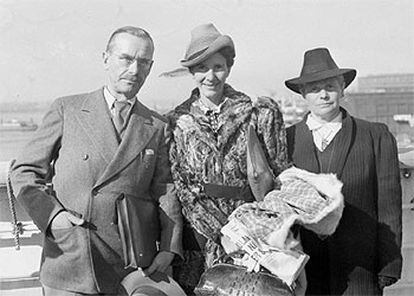Every morning he went to the same farm in Barcelona's Raval and couldn't pronounce the word ashtray.
It was the mid-seventies, the waitress who served the place knew him and teased him for it.
Colm Tóibín (Ireland, 67 years old) was then a young man eager for experiences in a country that was opening up to freedom after 40 years of dictatorship, and it would still take him more than a decade to publish his first novel,
El sur
, located precisely in Barcelona .
The story
Barcelona, 1975
is another brilliant tribute that he dedicated to those years.
Last Wednesday, before taking part in a talk with Jordi Puntí at the CCCB on the secret life of writers, he talked about the flashes of memories that come to him when he walks around the city today.
Author of a dozen novels and several collections of short stories, as he did with Henry James in
Portrait of the Adult Novelist , Tóibín has recreated the figure of Thomas Mann in
The Magician
from fiction
(Lumen), a critically acclaimed book, in which he addresses the homosexual drive that ran through the life of the author of
Death in Venice.
“
There are some who still deny Mann's homosexuality, and think that it was nothing.
In an argument with one of them, I once said to him: 'Look at these four sentences and tell me what else they can mean.'
If you are gay there are a series of things that you cannot ignore and that if you read them you know perfectly well what they mean”.
Married to Katia Pringsheim, with whom he had six children, the family life of the German Nobel laureate and his career take place against the backdrop of the turbulent 20th century that led him to exile in Los Angeles, as did other notable Germans of the time.
"I had to remove 55,000 words about Adorno, Alma Mahler and the other exiles, because I lost Mann's story," he says without a hint of regret, adding that it was in the Californian city where he wrote a large part of the book, a place where he spends long seasons with his partner when he is not teaching at Columbia University in New York.
in
the magician
, the Mann character reflects on how sticky the writer's job is compared to that of a composer: some can focus on the transcendence of God and others have to worry about the buttons on a jacket.
"That's exactly what I think," he says between laughs.
Thomas Mann, with his wife and daughter Erika in the middle, upon his arrival in New York in 1939.AP
Ask.
What is the most recurring misunderstanding about Thomas Mann?
Response.
That he was a great man, because that doesn't exist to begin with.
And besides, he wasn't.
For the Germans it is important today to have some figure from that period who behaved impeccably, because hardly anyone did.
Mann is much admired among the youth in Germany today, and here I am with my book… People became incredibly patriotic between August and September 1914. Normal, sane people went crazy over the blood, guns, and victory business. .
Q.
Artists are not vaccinated against nationalism.
A.
Indeed.
If what you are looking for is political thought, don't go looking for it in a writer or an artist, because we always see the other side, or we are feeling a new emotion or discovering something new.
Mann was a militaristic Prussian in 1914, and he became a great democrat in 1941. His speeches in the US that year showed that there was another Germany, that there was an alternative to the Nazis that came from ancient history, art and German thought.
Q.
Why did you decide to write a novel and not a biography?
A.
I wanted the reader to think that they were entering Mann's head and world.
I try to build that illusion and this has more to do with imagining than knowing.
I work on the intimate, introspective and domestic sphere of Mann, away from the great images of history.
P.
Mann was a very private man.
A.
He was a reluctant victim of historical events.
He was a conformist, conservative, ironic, and this was the last thing he needed in 1933. At the end of his life he wrote
The Confessions of the Swindler Felix Krull
and I don't think that was random.
There was a huge shift between the man of 1914 taking himself very seriously and the man of 1954 taking the entire European tradition of comic novels and applying it to himself.
Q.
To what extent did your years in the US influence you?
A.
Many of those exiles desperately wanted to return to where they came from as soon as they arrived in the US They took what they could and left nothing.
Mann was there for 14 years and didn't have a single American friend when he left.
And it's not like he saw the other exiles very often, either.
Q.
Neither were you very interested in the literary world or dealing with other writers in Germany.
R.
Indeed, perhaps that is why my book ends up being the portrait of a marriage, because Mann married someone extremely interesting, a woman more intelligent and cunning than him.
That he was homosexual didn't bother her, she belonged to the sophisticated bohemian, to the upper bourgeoisie, to that privileged class of assimilated Jews who practiced a certain idealism.
Marry a homosexual?
Well yes why not.
Q.
And you had the same relaxed attitude with your children, several of whom were openly homosexual.
R.
Your children lived a particular moment in the history of Germany.
They reach the end of their adolescence around 1920 and they don't want to know anything about militarism or authoritarianism, all that strict and checkered thing that we associate with the Germanic.
They want fun, drugs, have sex with anyone, say whatever they want and go anywhere.
This does not apply only to the children of Mann, but to an entire generation.
That is why there was such a
shock
when Hitler arrived, like the Americans when Trump arrived after Obama.
Nobody expected it.
Q.
Hidden homosexual desire is a motor for Mann's creativity, as it was for Henry James, the two writers whose lives he has fictionalized.
R.
I write about something that concerns me.
I grew up in Ireland at a time when homosexuality wasn't outlawed, it was out of the question.
You can't tell your own story over and over again because no one cares, but finding these figures who left so many clues in novels, diaries and letters allows me to piece together that public life and show what I imagine was their private life. .
In that clash between the public and the private is where I find the story.
I write about something very personal that I haven't fully resolved in myself, and I find metaphors, indirect ways of entering that story.
The Secret Erotic Life of Thomas Mann and that of Henry James interest me greatly.
P.
Today there is talk of fluid gender, and Thomas Mann seems an interesting figure in this regard.
He had a long family life and six children, some of whom were
queer
.
He also had homosexual desires that he dealt with in his diaries and in his fiction.
R.
There is a feeling in the gay and trans world that what is happening now, at this precise moment, is very exciting and what matters most.
I am one of those old men who believe that history must be known.
The historical line of gayness is never direct, it is a line that disappears, and there are figures like Henry James, but no young person is interested.
The trans discussions are so intense and the people who transition, and the new names that are given to the forms of desire, and everything is so urgent and immediate that the conversation about the past does not matter.
I know because I teach at Columbia University and I have it in front of me.
No matter how smart or brilliant these young people are, they are only interested in the now.
50% off
Exclusive content for subscribers
read without limits
subscribe
I'm already a subscriber







/cloudfront-eu-central-1.images.arcpublishing.com/prisa/VH72NERTWJEPPEX6A7TCMZLVMU.jpg)
/cloudfront-eu-central-1.images.arcpublishing.com/prisa/NFJ4WIJE5VH37NB3W7TPRSICEI.jpg)
